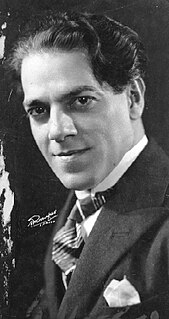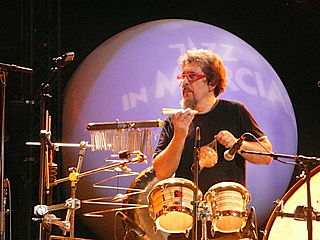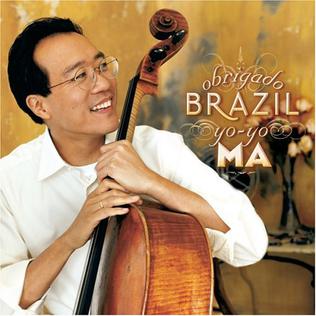
Heitor Villa-Lobos was a Brazilian composer, conductor, cellist, and classical guitarist described as "the single most significant creative figure in 20th-century Brazilian art music". Villa-Lobos has become the best-known South American composer of all time. A prolific composer, he wrote numerous orchestral, chamber, instrumental and vocal works, totaling over 2000 works by his death in 1959. His music was influenced by both Brazilian folk music and by stylistic elements from the European classical tradition, as exemplified by his Bachianas Brasileiras and his Chôros. His Etudes for classical guitar (1929) were dedicated to Andrés Segovia, while his 5 Preludes (1940) were dedicated to his spouse Arminda Neves d’Almeida, a.k.a. "Mindinha." Both are important works in the classical guitar repertory.

Cyro Baptista is a Brazilian percussionist in jazz and world music. He creates many of the percussion instruments he plays.

Obrigado Brazil is a music album by Yo-Yo Ma.

Beat the Donkey is an album by percussionist Cyro Baptista, which marked the debut of his rotating percussion and dance ensemble that would become known as Beat the Donkey, which was released on the Tzadik label in 2002.

Filmworks VII: Cynical Hysterie Hour is a 1989 album by John Zorn featuring music written for a series of Japanese animated shorts that were created by Kiriko Kubo. It features Zorn's first music for cartoons and was originally released on the Japanese Sony label in limited numbers. In late 1996 Zorn finally attained the rights for his music and remastered and re-released the album on his own label, Tzadik, in 1997.
Chôros is the title of a series of compositions by the Brazilian composer Heitor Villa-Lobos, composed between 1920 and 1929.

Banquet of the Spirits is an album by percussionist Cyro Baptista which featured the debut of the band that would become known as Banquet of the Spirits - Baptista, bassist Shanir Ezra Blumenkranz, keyboard player Brian Marsella, and drummer Tim Keiper - which was released on the Tzadik label in 2008.

Love the Donkey is an album by percussionist Cyro Baptista's percussion and dance ensemble Beat the Donkey, which was released on the Tzadik label in 2005. The album was privately released as Beat the Donkey Beat in 2004.

Chôros No. 1 is a composition for guitar by the Brazilian composer Heitor Villa-Lobos, written in 1920.

Chôros No. 2 is a duet for flute and clarinet written in 1924 by the Brazilian composer Heitor Villa-Lobos. It is part of a series of fourteen numbered compositions collectively titled Chôros, ranging from solos for guitar and for piano up to works scored for soloist or chorus with orchestra or multiple orchestras. and in duration up to over an hour. Chôros No. 2 is the shortest in the series, a performance lasting only about two-and-a-half minutes.

Chôros No. 3, "Pica-pau" (Woodpecker) is a work for male choir or instrumental septet, or both together, written in 1925 by the Brazilian composer Heitor Villa-Lobos. It forms a part of a series of fourteen numbered compositions collectively titled Chôros, ranging from solos for guitar and for piano up to works scored for soloist or chorus with orchestra or multiple orchestras. and in duration up to over an hour. Chôros No. 3 is one of the shorter members of the series, a performance lasting about three-and-a-half minutes.

Chôros No. 7, subtitled "Settimino" (Septet), is an instrumental septet written in 1924 by the Brazilian composer Heitor Villa-Lobos. It is part of a series of fourteen numbered compositions collectively titled Chôros, ranging from solos for guitar and for piano up to works scored for soloist or chorus with orchestra or multiple orchestras, and in duration up to over an hour. Chôros No. 7 is of modest length, a performance lasting about eight-and-a-half minutes.

Chôros No. 5 is a solo piano composition written in 1925 by the Brazilian composer Heitor Villa-Lobos. It forms a part of a series of fourteen numbered compositions collectively titled Chôros, ranging from solos for guitar and for piano up to works scored for soloist or chorus with orchestra or multiple orchestras, and in duration up to over an hour. Chôros No. 5 is one of the shorter members of the series, with a performance lasting about four-and-a-half minutes.

Chôros No. 12 is an orchestral work written between 1925 and 1945 by the Brazilian composer Heitor Villa-Lobos. It is part of a series of fourteen numbered compositions collectively titled Chôros, ranging from solos for guitar and for piano up to works scored for soloist or chorus with orchestra or multiple orchestras, and in duration up to over an hour. Chôros No. 12 is one of the longest compositions in the series, a performance lasting about 35 minutes.

Chôros No. 9 is an orchestral work written between 1929 and 1942 by the Brazilian composer Heitor Villa-Lobos. It is part of a series of fourteen numbered compositions collectively titled Chôros, ranging from solos for guitar and for piano up to works scored for soloist or chorus with orchestra or multiple orchestras, and in duration up to over an hour. A recorded performance of Chôros No. 9 made by the composer lasts almost 28 minutes.

Chôros No. 6 is an orchestral work written between 1925 and 1942 by the Brazilian composer Heitor Villa-Lobos. It is part of a series of fourteen numbered compositions collectively titled Chôros, ranging from solos for guitar and for piano up to works scored for soloist or chorus with orchestra or multiple orchestras, and in duration up to over an hour. Chôros No. 6 is one of the longer compositions in the series, lasting about 25 minutes in performance.

Chôros No. 8 is a work for orchestra and two pianos, written in 1925 by the Brazilian composer Heitor Villa-Lobos. It is part of a series of fourteen numbered compositions collectively titled Chôros, ranging from solos for guitar and for piano up to works scored for soloist or chorus with orchestra or multiple orchestras, and in duration up to over an hour. A recording of Chôros No. 8 conducted by the composer lasts 22 minutes.

Chôros No. 4 is a quartet for three horns and trombone, written in 1926 by the Brazilian composer Heitor Villa-Lobos. It forms a part of a series of fourteen numbered compositions collectively titled Chôros, ranging from solos for guitar and for piano up to works scored for soloist or chorus with orchestra or multiple orchestras, and in duration up to over an hour. Chôros No. 4 is one of the shorter members of the series, a performance lasting about five-and-a-half minutes.

Introdução aos Chôros: Abertura, is a composition for guitar and orchestra by the Brazilian composer Heitor Villa-Lobos, composed in 1929 as an overture to precede a complete performance of his series of fourteen Chôros. A performance of just the Introdução lasts about thirteen minutes.







